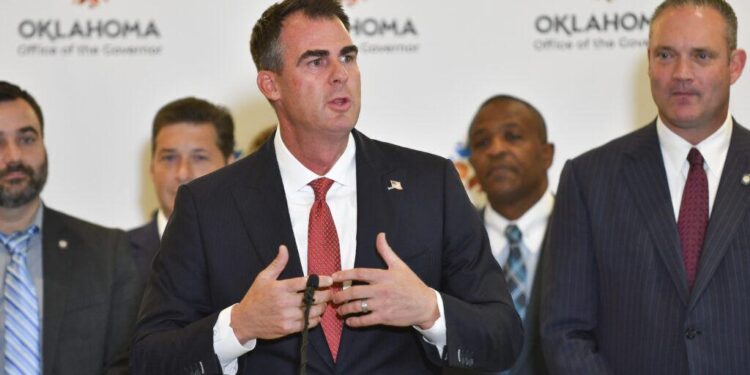OKLAHOMA CITY — Gov. Kevin Stitt said he didn’t know an Oklahoma Highway Patrol trooper was going to ticket an Otoe-Missouria citizen for having a tribal license plate while living outside her tribe’s boundaries, but that he “100%” supports the action.
In an interview, Stitt said he did not direct the Oklahoma Department of Public Safety to crack down on some drivers with tribal license plates, but he did tell the agency to “just enforce the law.”
That directive, Stitt said, came after Turnpike Authority officials told him this summer the state could not collect nearly $5 million in turnpike fees over a two-month period because a new cashless tolling system can’t read license plates issued by tribes.
The Oklahoma Highway Patrol recently started ticketing Indigenous citizens who have tribal tags but don’t live within their nation’s boundaries — an apparent change in enforcement that spurred confusion and outrage from many tribal members. Troopers are not pulling people over solely because of their license plates but are addressing the tag issue if a driver is pulled over for another reason, tribal officials have said.
An agency spokesperson said troopers are following a 30-year-old U.S. Supreme Court ruling that says tribes can only issue license plates to its citizens that “principally garage” their vehicle on the tribe’s reservation.
Now, Stitt wants all Oklahoma tribes that issue their own license plates to compact with the state to split tribal tag revenue. He said it’s “fundamentally unfair” that non-Native citizens pay car tag fees to the state when Indigenous citizens with tribal tags living outside their tribe’s boundaries don’t pay the state anything.
“We all drive on the same roads,” Stitt said. “And in my opinion, we should all pay the same tag, title and tax. It’s pretty simple.”
“When you look at the Otoe-Missouria tribe or the Apache or the Creek or Seminole, any of those tags, they’re literally just printing the tag and the state’s not receiving one dime of revenue.”
Oklahoma’s tribes have a multibillion-dollar economic impact in the state and contribute funds to local road projects, schools, health care initiatives and more.
The Choctaw and Chickasaw nations already have compacts with the state that allow any of their tribal citizens, regardless of where they live, to have tribal license plates issued by Service Oklahoma.
The Cherokee Nation issues its own license plates to members across the state and maintains it has a valid compact with the state to do so. But Stitt, a member of the Cherokee Nation, contends his tribe’s compact expired and is no longer valid, despite legislation passed this year that allowed some tribes to extend their motor vehicle registration compacts until December 2024.
“Gov. Stitt’s position that Cherokee citizens living outside of the Cherokee Nation reservation unlawfully operate vehicles with Cherokee Nation tags is, frankly, ignorant and unquestionably illegal,” Cherokee Nation Principal Chief Chuck Hoskin Jr. said in a statement.
Hoskin and other tribal leaders have hinted they may pursue litigation as a result of the increased enforcement of tribal tag protocols.
Stitt said he’s not worried about possible lawsuits.
“We’re following the law,” he said.
Stitt said several tribes have reached out to talk about compacting on motor vehicle registrations in light of increased enforcement efforts, but he declined to name them.
The governor said he wants to make it clear through compacts that Native Americans with tribal tags living off their tribe’s lands will have to pay the same vehicle registration fees as non-Native Oklahomans. Indigenous citizens living on their tribe’s reservation won’t owe the state anything to register their vehicle through their tribe, Stitt said.
Attorney General Gentner Drummond may issue legal guidance on tribal tag issues that will encourage the tribes to compact with the state, said spokesperson Phil Bacharach.
House Democrats criticized Stitt for continuing to clash with the tribes.
“This is another attempt by the governor to undermine our tribal leaders and nations as he continues to demonstrate his inability to work with them,” the Democrats said in a joint statement. “If he has valid concerns, he should lead by having discussions with tribal leaders instead of creating unnecessary chaos that is harmful and unproductive.”
Stitt has had a contentious relationship with many Oklahoma tribes since he unsuccessfully pushed to renegotiate the state’s tribal gaming compacts.
The governor also expressed safety concerns about law enforcement officers not having tribal vehicle registration information when making traffic stops.
“The most dangerous part of a ticket stop is pulling up to that car, not knowing who’s in it, not knowing what crime they’ve committed, not knowing if there’s any felons, or if it (the vehicle) was stolen,” Stitt said. “We have no idea who they are.”
Public Safety Commissioner Tim Tipton told state senators in July the number of unregistered tribal tags was at “a critical level” and that the Highway Patrol doesn’t receive registration details on many tribal license plates.
Records from the Department of Public Safety show 24 tribes have the ability to upload tribal vehicle registration information to the Oklahoma Law Enforcement Telecommunications System, which officers check during traffic stops. The Chickasaw and Choctaw nations also provide that information through their partnerships with the state.
The state cannot confirm the accuracy or timeliness of the vehicle registration information reported by tribes, said agency spokesperson Sarah Stewart.
Representatives from the Cherokee Nation and other tribes said they have long uploaded all vehicle registration information into the system.
“Law enforcement have reported no challenges in accessing this information during traffic stops,” said Cherokee Nation spokesperson Julie Hubbard.
Oklahoma Voice is part of States Newsroom, a nonprofit news network supported by grants and a coalition of donors as a 501c(3) public charity. Oklahoma Voice maintains editorial independence. Contact Editor Janelle Stecklein for questions: info@oklahomavoice.com. Follow Oklahoma Voice on Facebook and Twitter.
Want to reach a local audience and grow your business?
Our website is the perfect platform to connect with engaged readers in your local area.
Whether you're looking for banner ads, sponsored content, or custom promotions, we can tailor a package to meet your needs.
Contact us today to learn more about advertising opportunities!
CONTACT US NOW




